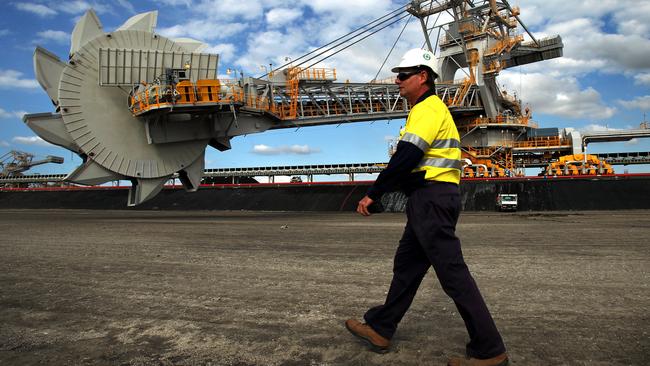$200m of Australian coal stuck at China port
Fifteen ships have been anchored at Chinese port since June as authorities oversee a go-slow on Australian coal.

More than $200m of Australian coal is stuck in 20 giant ships off the Chinese port of Jingtang, as Xi Jinping’s administration punishes one of Australia’s biggest exports at the expense of its own steelmaking industry.
Fifteen of the ships have been anchored at the northern Chinese port since June as authorities oversee a go-slow on Australian coal to support more expensive local producers.
“It can’t go on forever because they are really crippling themselves,” former trade minister Mark Vaile told The Weekend Australian.
According to shipping data analysed by Bloomberg, the ships collectively hold 2 million to 3 million tonnes of mostly coking coal, a key ingredient in steelmaking, with a combined value well over $200m.
The bulk vessels are the latest conscripts in China’s sweeping campaign of trade warfare against Australia, its fifth-biggest source of imports.
This week Victorian timber was added to a list of industries hit by China, which includes wine, barley, beef, wheat, lobsters and cotton, with sugar and copper cited by state media as the next targets in the extraordinary campaign by Australia’s biggest customer.
The fallout has extended into Australia’s gas industry after Woodside Petroleum revealed Chinese buyers axed a potential deal to buy a stake in its $16bn Scarborough gas project amid trade tensions.
Mr Vaile — the chairman of Whitehaven, a coal producer which does not sell to China — said it was important to get the relationship between the two highly complementary economies back on track.
“There are a number of people in the business community, in the private sector, asking how can we bridge this divide at the moment,” he said.
Industry experts say China’s ban on Australian coal could extend well into 2021.
“We have assumed that Beijing is demonstrating a point to Canberra, showing Australia’s heavy economic reliance on China and signalling that a more neutral stance between the US and China would be wise,” Credit Suisse analyst Matthew Hope said.
“On that assumption, we suggest that the Australian coking coal import ban will lift after Chinese New Year. However, there is a possibility that China wants to go further and punish Australia economically until Canberra concedes its weakness and lower stature. But we doubt Canberra would ever make that concession, so it’s possible that the ban may be protracted.”
Mr Vaile, who also chairs the Australian American Leadership Dialogue, said he thought the Morrison government had extended a number of “olive branches” to the Chinese government.
These included the Prime Minister floating a travel bubble with China and offers by Trade Minister Simon Birmingham and Agriculture Minister David Littleproud to meet with their Chinese counterparts.
The Whitehaven chairman said the Chinese needed to understand the principle of mutual respect “works both ways”.
“The Chinese have got to respect that we’re a democracy. We’re a very open economy. We have freedom of the press and our government doesn’t control all the commentary that goes on in the country,” he said.
Robert Millner, the chairman of coal producer New Hope, said he was concerned by China‘s tactics, which appeared to single out Australian coal over other international suppliers.
“The whole China turmoil with coal mining and agricultural bans is certainly a great cause for concern for our whole country,” Mr Millner told The Weekend Australian. “It‘s a critically important relationship. It should be resolved.”
All of the vessels stuck in Jingtang Port departed from Australian ports. Nine left from the BHP-owned Hay Point Terminal in north Queensland, eight from Gladstone Port and the remaining four from Dalrymple Bay Coal Terminal.
One is an Indian-flagged vessel packed with Australian coal which has been prevented from leaving Chinese waters, even after Japan offered to accept the ship’s cargo to end the more-than-five-month standoff.
The bulk carrier has been turned into a “floating prison” for its 23 Indian crew, according to the National Union of Seafarers of India.
Sources in China’s steel industry, the world’s biggest, told The Weekend Australian politics had trumped their need for a “stable, predictable supply” of coking coal. “The current situation is beyond the industry’s control,” said one source in the industry, who said they were forbidden to talk further on the subject.
Neither the Jingtang Port authority or Ministry of Transport replied to The Weekend Australian’s questions on the hold up.
China’s foreign affairs ministry said China had been “providing convenience for the sailors involved” while complying with its COVID-19 port restrictions.
Senator Birmingham said Australian authorities had contacted their Chinese counterparts about the stranded Indian seafarers.
“It is unacceptable for such uncertainty to exist over such a long period of time that effectively leaves sailors stranded at sea,” Senator Birmingham said. “This isn’t just a trade issue; it is an issue about respect and regard for the wellbeing of the individuals.”
On Friday, China’s foreign ministry spokesman Wang Wenbin said: “As far as I know, this Indian vessel has berthed near Hebei’s Jingtang port since June, and China has never denied its departure.”
“The freight forwarder doesn’t want to adjust the plans for the vessel due to commercial interests, which is the real cause of the situation,” the foreign affairs ministry spokesman said at a daily press briefing in Beijing.
The day before, the foreign affairs ministry spokesman said the reason China and Australia’s relations were strained was “very clear”.
Mr Wang said the Australian government had repeatedly “spoken and acted out of turn” on Hong Kong, Xinjiang and Taiwan, had accused China of engaging in “so-called ‘intervention and infiltration activities’ in Australia”, and created barriers to “normal exchanges and co-operation” between the two countries.
“Let him who tied the bell on the tiger take it off. One’s fault should be amended by oneself,” the foreign ministry spokesman said.
